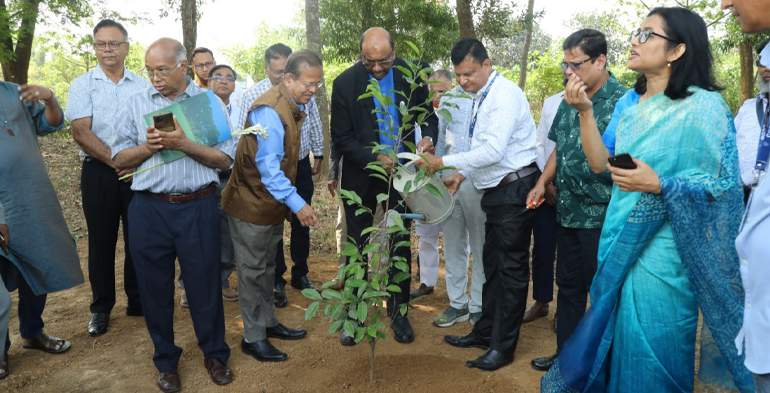
Agrilife24.com: The Christian Commission for Development in Bangladesh (CCDB), in collaboration with the World Council of Churches (WCC) and the National Council of Churches in Bangladesh (NCCB), organized a high-level conference titled “Climate Justice and a Nexus Approach to Land, Water and Food” at the CCDB Climate Centre on April 11, 2025. The event brought together global faith leaders, development practitioners, climate experts, and policy makers, offering a platform to discuss the interlinked between climate justice and the land-water-food nexus.
David A. Halder, Honorable Chairman of the CCDB Commission, delivered the opening remarks and warmly welcomed the distinguished guests on behalf of CCDB.
Juliate Keya Malakar, Executive Director of CCDB and Governing Body Member of WCC, set the tone of the conference by stating, “Climate change is not abstract—it is a cruel reality for people in Bangladesh and we need to find solutions for our resilience together.”
Christopher Adhikari, President of the National Council of Churches in Bangladesh (NCCB), echoed this urgency, noting, “We live on a planet where the climate is changing. Addressing climate change is not optional—it is an undeniable task.”
The keynote address was delivered by Rev. Prof. Dr. Jerry Pillay, General Secretary of the World Council of Churches. He recognized CCDB’s leadership in the climate change arena and extended warm greetings to all participants on behalf of WCC. He emphasized,
“Climate change reduces agricultural production, worsens existing vulnerabilities, and contributes to rising food insecurity . Our land, water, and food systems are deeply impacted by the changing climate. We need a holistic, ethical and integrated approach to tackle this crisis..”
He further stressed the importance of integrating all WCC programs to address land, water, and food security in the pursuit of climate justice. He advocated for stronger land rights, intensified water conservation efforts, deeper collaboration with local governments and faith communities, and a conscious focus on nutrition and education. He concluded by urging collective action for the upliftment of vulnerable communities.
A panel discussion, moderated by Dinesh Suna, Program Executive of EWN and Land, Water & Food Advocacy at WCC, featured prominent experts including: Dr. Ahsan Uddin Ahmed, Executive Director, Centre for Global Change; Farid Uddin Ahmed, Former Executive Director, Arannak Foundation; and Juliet Keya Malakar, Executive Director, CCDB Dr. Ahsan Uddin Ahmed remarked, “Climate change is an intergenerational crisis that we have contributed to. We must be conscious of our carbon footprint. Unfortunately, there is no new or additional financing available for tackling climate change—but although we are among its worst victims, we have the courage to fight back.”
Farid Uddin Ahmed highlighted the alarming rate of deforestation and its impact on water availability and food production. He added, “Water is a serious concern. Yet people’s traditional knowledge and experience are valuable assets in adapting to climate change.”
Juliate Keya Malakar emphasized the need for climate actions that ensure justice within communities, particularly spotlighting the vulnerability of ethnic minorities in northern Bangladesh. She concluded by showcasing CCDB’s initiatives toward building climate resilience across the country.
























